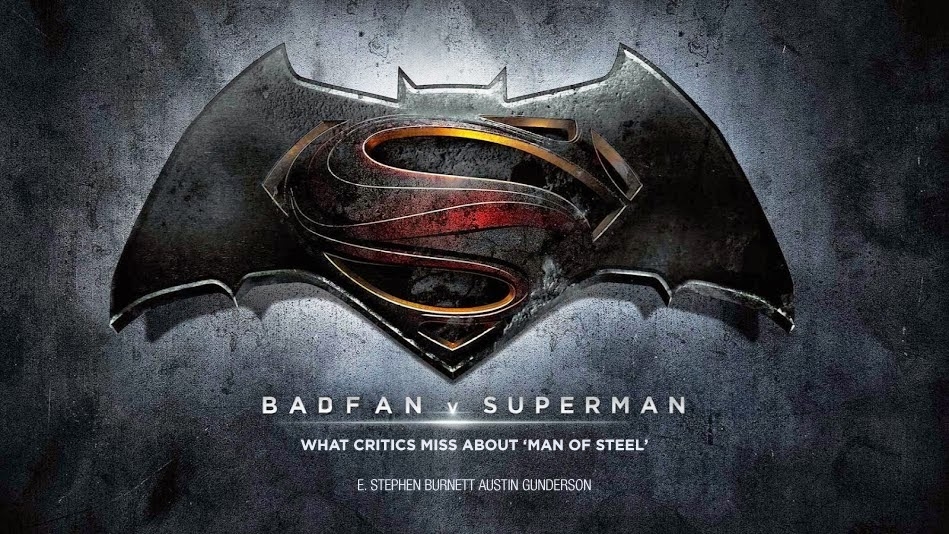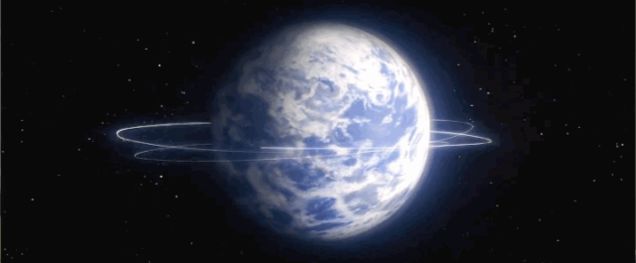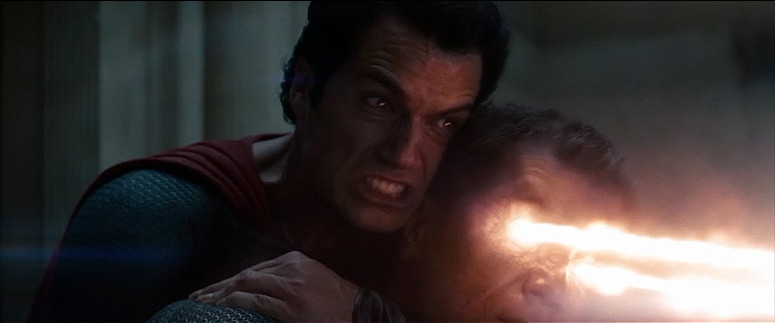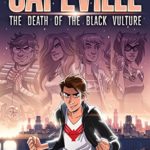Badfan v Superman 5: You’ll Believe A Man Can Die
 SpecFaith staff explorers E. Stephen Burnett and Austin Gunderson share their month-long conversation about Man of Steel and how the film flies over many critics’ heads. See part 1, part 2, part 3, part 4, or read the the whole Badfan v Superman series so far.
SpecFaith staff explorers E. Stephen Burnett and Austin Gunderson share their month-long conversation about Man of Steel and how the film flies over many critics’ heads. See part 1, part 2, part 3, part 4, or read the the whole Badfan v Superman series so far.
E. Stephen Burnett: Some folks will scowl when I say that Superman in Man of Steel isn’t grimdark. They’ll instantly say that Superman killed General Zod and that’s bad. Superman doesn’t do that. … So let’s talk about that …
Austin Gunderson:
Snyder has certainly managed to carve out a unique visual style over the course of his filmography. Beginning with 300 (of which I’ve only seen parts), continuing through his other comic-book movies, and extending even to fare intended for children (Legend of the Guardians: The Owls of Ga’Hoole is an underrated masterpiece), his films revel in stylistic violence, precise composition, and prolific speed-ramping of overcranked footage.
But not Man of Steel. Weirdly, the one movie that most begs for the “Snyder treatment” of grandiose visual flair instead gets approached like a non-drunk Bourne film: the palate’s somber, the camera’s handheld, and the action’s nearly too fast to follow. It’s so fast, in fact, that the filmmakers had to invent new methods of capture and compositing.1
It’s obviously intentional. But why?
That question was answered by my wild grin the first time I saw the film in theaters. What I was watching was something I’d not seen before: a superhero movie actually giving its subject a realistic portrayal. Here, superhuman speed gets fully integrated into the action. Here, there are no Hollywood moments of “Oh-now-that-I’ve-pummeled-you-into-submission-let-me-wax-eloquent-about-your-inferiority-until-you-recover-the-strength-to-finish-me-off.” Here, when a character threatens to destroy someone, he actually wants to do it. Here, someone like Superman is actually necessary.
So when I say that Man of Steel made me fall in love with Superman, I mean for the first time ever. While I recognize that people adore the 1978 film, and while I admit that its first third looks very pretty, and that the music is iconic, in the final analysis that film is the Ur-example of everything about the Superman mythos for which I feel contempt.
 Why would I say such a thing, you ask? Well, how is the story’s conflict ultimately resolved? By the most bald-faced deus ex machina in blockbuster history: Superman makes a tough decision, Superman doesn’t like the consequences of said decision, Superman flies around the earth fast enough to reverse its rotation (which makes no sense) and thus reverse time (which makes even less sense),2 and finally Superman, now with special insight into the future, makes a perfect decision that has no negative consequences. The end.
Why would I say such a thing, you ask? Well, how is the story’s conflict ultimately resolved? By the most bald-faced deus ex machina in blockbuster history: Superman makes a tough decision, Superman doesn’t like the consequences of said decision, Superman flies around the earth fast enough to reverse its rotation (which makes no sense) and thus reverse time (which makes even less sense),2 and finally Superman, now with special insight into the future, makes a perfect decision that has no negative consequences. The end.
The affront presented by such a scene to basic physical laws is surpassed only by the affront it presents to narrative laws. Supes’ solution to his dilemma comes completely out of the blue and effectively divorces him from the entirety of human experience by granting him a blank waiver from regret and a blank check to alter reality at his whim. Not only is Superman physically invulnerable, he’s emotionally invulnerable as well, because he always gets his way.

So while it was nifty that the first film made us believe a man could fly, it was absolutely crucial for Man of Steel to make us believe a man could die. Snyder knew this; he knew that Superman’s invulnerability, narratively speaking, was his greatest weakness. But how do you scrape off that glossy sheen without sullying the character underneath? No one — least of all me — wanted to see another morally-rudderless Supes a la Superman Returns. No, to be worthy of admiration Supes has to be a bulwark. But if he’s gonna be interesting to watch, we need to see him struggle and legitimately fear for the outcome. And that’s a matter of tone.
And that’s why Man of Steel looks dark and moody, and it’s why Superman isn’t allowed to just pull a Kryptonian Prisoner Nonviolent Stasis Incarceration Module, or some such nonsense, out of his hat at the last possible second. No, this is a world where Superman, because of his moral strength, is physically and emotionally vulnerable.
Because sometimes, the consequences of the right decision don’t come with an easy fix.
E. Stephen Burnett: Given: Superman kills General Zod in Superman II, by calmly de-powering the villain in private, feigning to surrender, then crushing his hand and tossing him off an ice cliff;
Given: Superman also kills Zod in Man of Steel, by barely strong-arming the villain in public, wrestling to keep him from killing innocent people, then snapping his neck;
Then: Why do people complain about the Man of Steel death and not the Superman II death?
Regarding Superman II (which I haven’t seen), my only explanation is that people must be pretending the film never existed. Because otherwise their outrage over Supes’ supposed alteration at the bloody hands of Zack Snyder makes absolutely zero sense.
Read Badfan v Superman 6: Game of Tones. Or see the entire Badfan v Superman series.
- See http://www.fxguide.com/featured/man-of-steel-vfx-milestones. ↩
- Response from Stephen: One fan theory is that Superman is not actually making the earth reverse orbit and thereby causing a time reversal, but rather flying back in time and causing the earth to reverse its orbit. It’s still another example of a made-up Superman power and indeed, it rings a bit hollow. In fact that was originally planned as the ending of Superman II, according to the original director, Richard Donner. But they moved it to the first film and would have planned another ending for Superman II. Richard Lester’s revision was even worse: a super-amnesia-inducing-smooch that retcons Lois Lane not knowing Clark’s identity. Blimey. And that left the 2006 disc-only Richard Donner Cut of Superman II with no option, really, than to revert to the fly-back-and-reverse-time finale again. ↩









































Ain’t it the truth about Owls of Ga’Hoole! I love both the books and the movie, but maybe people weren’t ready for an animal movie about the Nazis and the Holocaust.
Ah, so that’s what it was about? Fascinating. I may need to re-evaluate my admittedly distant negative perception of the film. In general whenever live-action directors attempt animation or animation directors attempt live-action, it’s usually a misfire.
Well, the Guardians of Ga’Hoole film also attempted to combine St. Aggie’s, the evil ‘orphanage’ from the first few books, with the Pure Ones, the more Nazi-esque enemies from the latter part of the series.
Except Snyder’s distaste in an interview I recently read for the no kill rule makes me distrust him. Would he really have Supes take on an arc that is eventually morally consistent with his characterization if DC honchos didn’t force his hand? Also, his love for Frank Miller is discomfiting. Yes, Miller wrote good stuff, but he also wrote entries that had Bats enjoy torture and beating up folks more than Jack Bauer would, that had Batman do CHILD ABUSE on Robin, and had Batman arguably murder someone by intending to kill instead of capture someone. If Snyder ever goes beyond Dark KNight Returns to saying he liked All-Star Batman and Robin or Dark KNight Strikes Again, I’ll wash my hands of the film.
For my part, I want the stories to show both–a respect for the desire never to take a life and to find another way, and a respect for the truth of reality that sometimes there really is no option. But, as with Superman, it should be a grievous decision that brings consequences (and, I hope in Batman v Superman, a vow never to do it again).
Yeah, the ending of the original film is a bit….waff. Having watched Man of Steel, I think it shows more narrative unity, but …it’s missing something still…
Like, the scenes with young Clark, where he’s cowering in the closet because he can’t control his vision–those are dynamite. But I had a hard time connecting emotionally to present-day Clark, because I didn’t see much emotion in him.